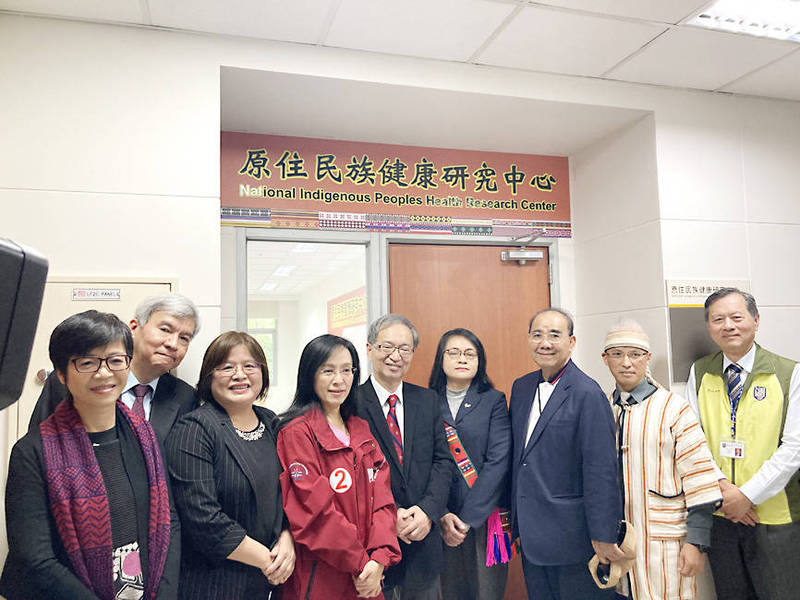《TAIPEI TIMES》Health research center for indigenous people opens

Officials mark the establishment of the National Indigenous Peoples Health Research Center in Miaoli County yesterday. Photo courtesy of the National Health Research Institutes
EQUALITY: The center is tasked with implementing the Indigenous Peoples Health Act, which requires the nation to resolve health inequality affecting indigenous peoples
By Peng Chien-li and Jonathan Chin / Staff reporter, with staff writer
The National Health Research Institutes (NHRI) yesterday marked the founding of the National Indigenous Peoples Health Research Center in a bid to close the healthcare gap between ethnic Han and indigenous populations.
The center is tasked with implementing the Indigenous Peoples Health Act (原住民族健康法), which requires the nation to resolve health inequality affecting indigenous people and develop health policies that respect their culture and aspirations, NHRI officials told the plaque unveiling ceremony in Miaoli County.
Minister of Health and Welfare Hsueh Jui-yuan (薛瑞元),
Democratic Progressive Party legislators Saidhai Tahovecahe, Asenay Daliyalrep and Wu Yu-chin (吳玉琴), and Chinese Nationalist Party (KMT) Legislator Sufin Siluko attend the event.
Indigenous people have played an indispensable role in Taiwanese history, but today they face unique challenges to gain access to proper health and well-being policies, officials said.
The Ministry of Health and Welfare spearheaded the act’s drafting in 2017 and lawmakers approved the final version of the law in May, which President Tsai Ing-wen (蔡英文) promulgated the following month, they said.
The act’s promulgation marked a major turning point in the nation’s effort to achieve equality in
healthcare for indigenous people, officials said.
Under the legislation’s mandate, the ministry created an indigenous people’s health policy conference to coordinate multi-agency responses to health matters affecting indigenous Taiwanese with the research center via the NHRI, they said.
Center personnel are to flesh out the organization’s goals and operational procedures and complete a database on the state of indigenous Taiwanese health over the next two years, the officials said.
The center is to prioritize recruiting experts and academics of indigenous descent, members of the Council of Indigenous Peoples, societies of indigenous academics and groups, and healthcare practitioners in this preparatory period, they said.
The database would enable the health policies to be
formulated according to the needs of indigenous Taiwanese and its planned expansion into cultural and societal matters could facilitate better welfare policies, officials said.
Big data should play a role in the center’s analytical approach to problems, they said.
The research center is envisioned to become a platform for science and cultural dialogue, with close ties to indigenous communities to ensure its work stays relevant to the wishes of indigenous people, said NHRI vice president Wayne Sheu (許惠恒), who heads the center.
The group would perform the additional role of acting as a conduit between communities and the central government toward the realization of the right of indigenous Taiwanese to participate in making healthcare policies that would apply to their communities, he said.
新聞來源:TAIPEI TIMES



















